Expansion of Private Aviation in China: A Business Analysis Report
VerifiedAdded on 2021/09/12
|16
|3933
|79
Report
AI Summary
This report analyzes the expansion of the private aviation industry in China, focusing on the challenges faced by foreign companies like Airbus. The case study highlights the conflict between China's vast market potential, driven by a large number of billionaires and a growing consumer base, and the restrictive government regulations and control over airspace. The analysis identifies key problems, including strict government control, high taxes, and discrimination against foreign companies, which hinder the industry's growth. It explores the implications of these issues, such as increased costs for companies, slow economic development, and reduced foreign investment. The report also examines China's economic conditions and provides alternative solutions for Airbus, such as entering joint ventures and establishing wholly owned subsidiaries to overcome these challenges and capitalize on the growing private aviation market. The report offers insights into market dynamics, government regulations, and strategic recommendations to navigate the complex business environment in China.
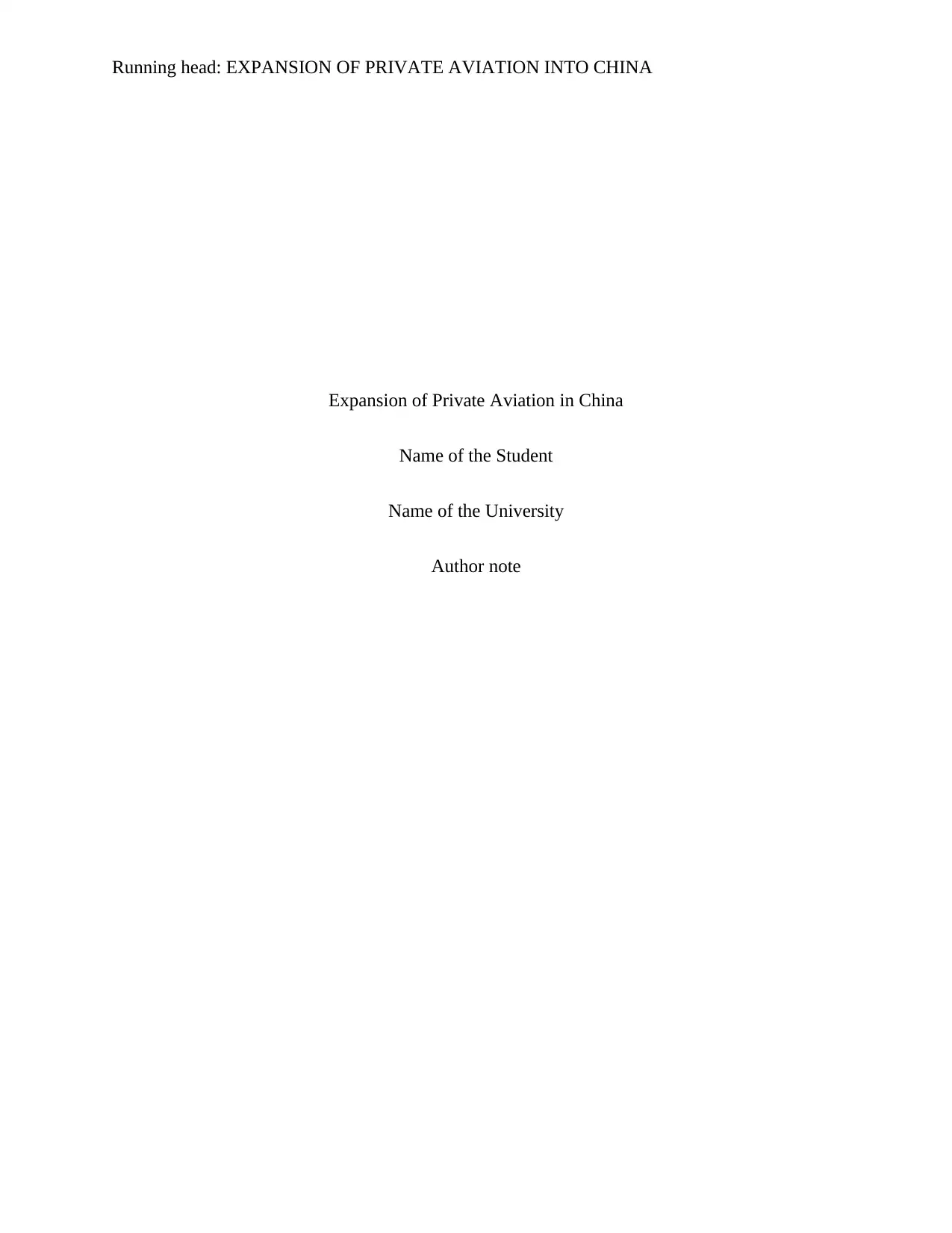
Running head: EXPANSION OF PRIVATE AVIATION INTO CHINA
Expansion of Private Aviation in China
Name of the Student
Name of the University
Author note
Expansion of Private Aviation in China
Name of the Student
Name of the University
Author note
Paraphrase This Document
Need a fresh take? Get an instant paraphrase of this document with our AI Paraphraser
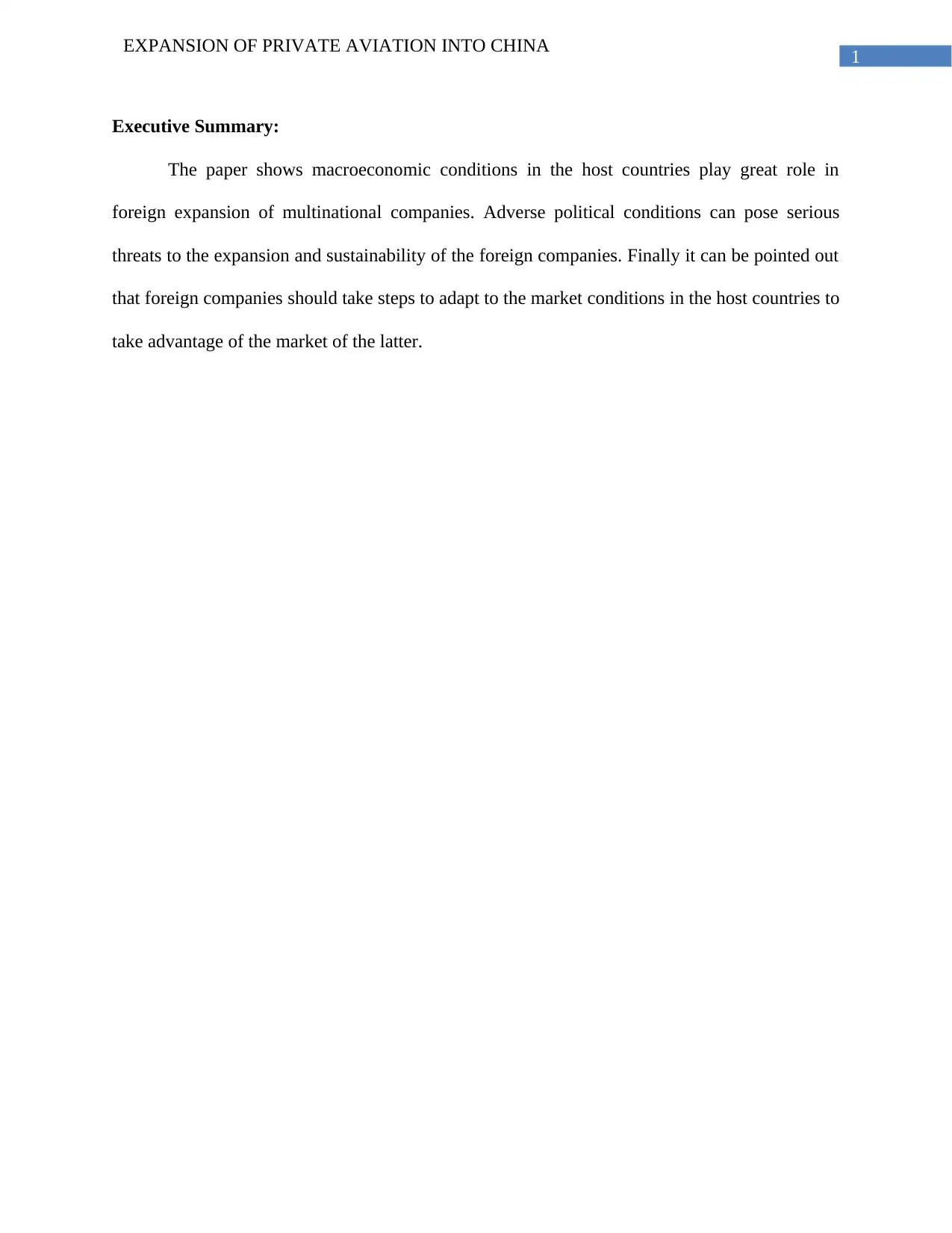
1
EXPANSION OF PRIVATE AVIATION INTO CHINA
Executive Summary:
The paper shows macroeconomic conditions in the host countries play great role in
foreign expansion of multinational companies. Adverse political conditions can pose serious
threats to the expansion and sustainability of the foreign companies. Finally it can be pointed out
that foreign companies should take steps to adapt to the market conditions in the host countries to
take advantage of the market of the latter.
EXPANSION OF PRIVATE AVIATION INTO CHINA
Executive Summary:
The paper shows macroeconomic conditions in the host countries play great role in
foreign expansion of multinational companies. Adverse political conditions can pose serious
threats to the expansion and sustainability of the foreign companies. Finally it can be pointed out
that foreign companies should take steps to adapt to the market conditions in the host countries to
take advantage of the market of the latter.
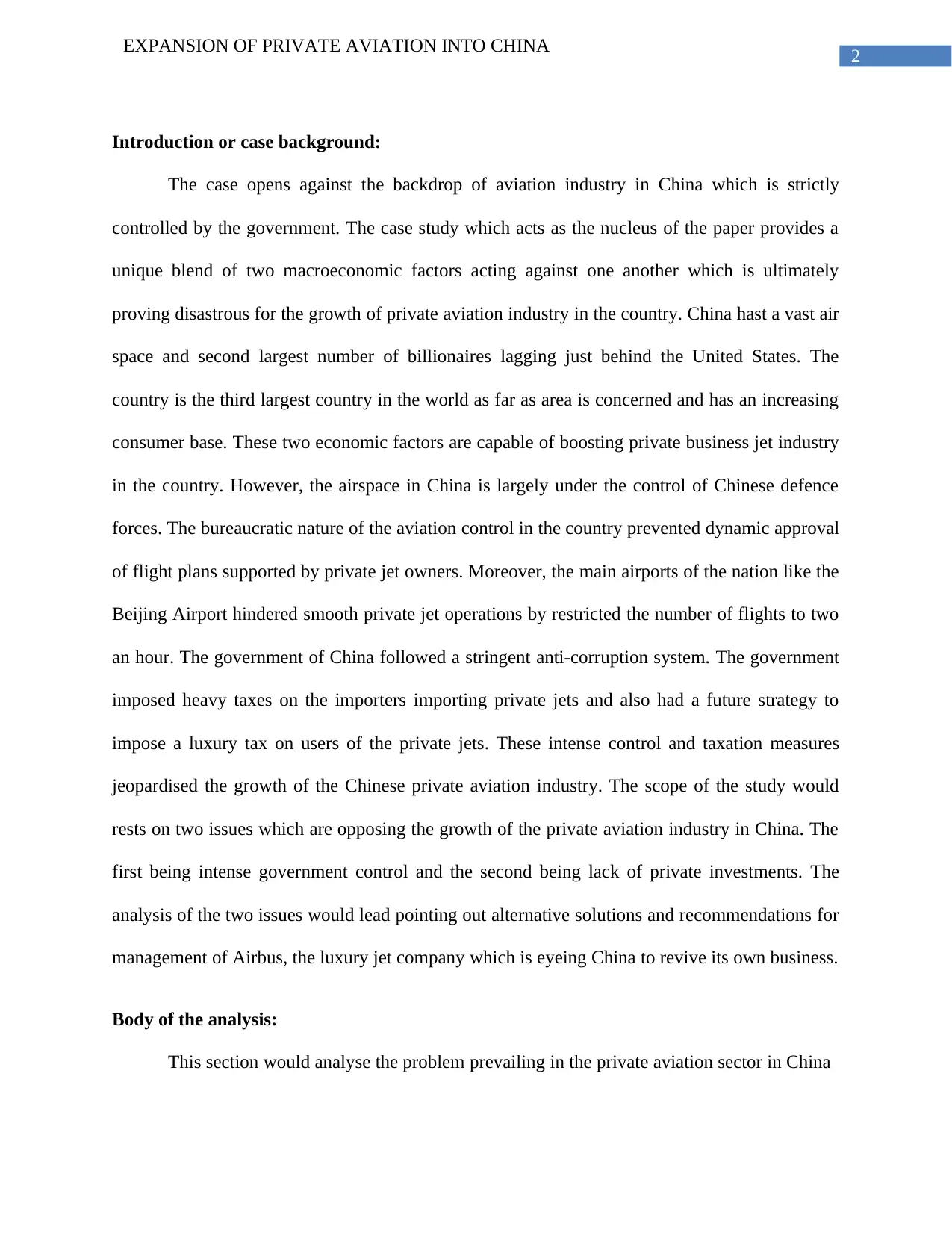
2
EXPANSION OF PRIVATE AVIATION INTO CHINA
Introduction or case background:
The case opens against the backdrop of aviation industry in China which is strictly
controlled by the government. The case study which acts as the nucleus of the paper provides a
unique blend of two macroeconomic factors acting against one another which is ultimately
proving disastrous for the growth of private aviation industry in the country. China hast a vast air
space and second largest number of billionaires lagging just behind the United States. The
country is the third largest country in the world as far as area is concerned and has an increasing
consumer base. These two economic factors are capable of boosting private business jet industry
in the country. However, the airspace in China is largely under the control of Chinese defence
forces. The bureaucratic nature of the aviation control in the country prevented dynamic approval
of flight plans supported by private jet owners. Moreover, the main airports of the nation like the
Beijing Airport hindered smooth private jet operations by restricted the number of flights to two
an hour. The government of China followed a stringent anti-corruption system. The government
imposed heavy taxes on the importers importing private jets and also had a future strategy to
impose a luxury tax on users of the private jets. These intense control and taxation measures
jeopardised the growth of the Chinese private aviation industry. The scope of the study would
rests on two issues which are opposing the growth of the private aviation industry in China. The
first being intense government control and the second being lack of private investments. The
analysis of the two issues would lead pointing out alternative solutions and recommendations for
management of Airbus, the luxury jet company which is eyeing China to revive its own business.
Body of the analysis:
This section would analyse the problem prevailing in the private aviation sector in China
EXPANSION OF PRIVATE AVIATION INTO CHINA
Introduction or case background:
The case opens against the backdrop of aviation industry in China which is strictly
controlled by the government. The case study which acts as the nucleus of the paper provides a
unique blend of two macroeconomic factors acting against one another which is ultimately
proving disastrous for the growth of private aviation industry in the country. China hast a vast air
space and second largest number of billionaires lagging just behind the United States. The
country is the third largest country in the world as far as area is concerned and has an increasing
consumer base. These two economic factors are capable of boosting private business jet industry
in the country. However, the airspace in China is largely under the control of Chinese defence
forces. The bureaucratic nature of the aviation control in the country prevented dynamic approval
of flight plans supported by private jet owners. Moreover, the main airports of the nation like the
Beijing Airport hindered smooth private jet operations by restricted the number of flights to two
an hour. The government of China followed a stringent anti-corruption system. The government
imposed heavy taxes on the importers importing private jets and also had a future strategy to
impose a luxury tax on users of the private jets. These intense control and taxation measures
jeopardised the growth of the Chinese private aviation industry. The scope of the study would
rests on two issues which are opposing the growth of the private aviation industry in China. The
first being intense government control and the second being lack of private investments. The
analysis of the two issues would lead pointing out alternative solutions and recommendations for
management of Airbus, the luxury jet company which is eyeing China to revive its own business.
Body of the analysis:
This section would analyse the problem prevailing in the private aviation sector in China
⊘ This is a preview!⊘
Do you want full access?
Subscribe today to unlock all pages.

Trusted by 1+ million students worldwide
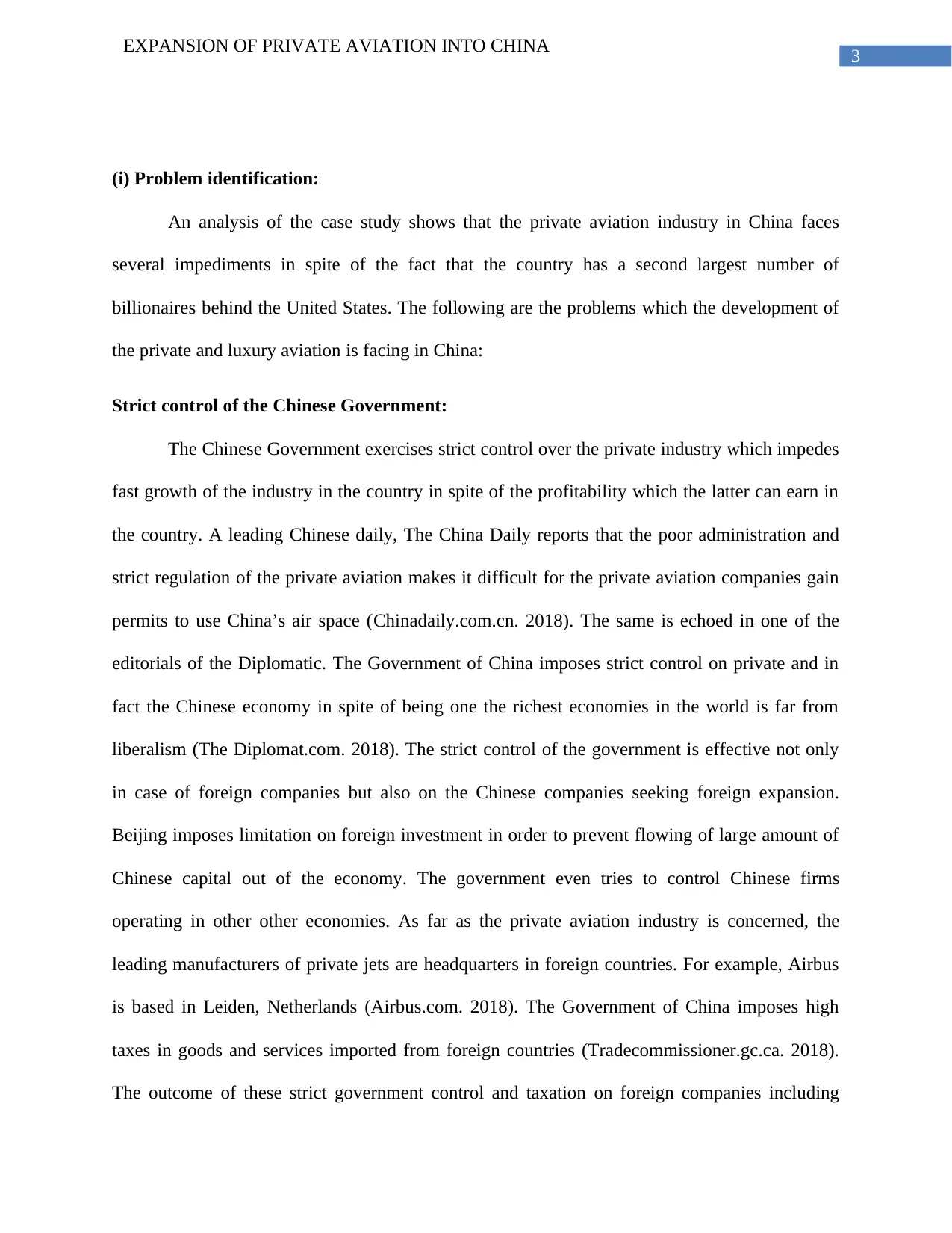
3
EXPANSION OF PRIVATE AVIATION INTO CHINA
(i) Problem identification:
An analysis of the case study shows that the private aviation industry in China faces
several impediments in spite of the fact that the country has a second largest number of
billionaires behind the United States. The following are the problems which the development of
the private and luxury aviation is facing in China:
Strict control of the Chinese Government:
The Chinese Government exercises strict control over the private industry which impedes
fast growth of the industry in the country in spite of the profitability which the latter can earn in
the country. A leading Chinese daily, The China Daily reports that the poor administration and
strict regulation of the private aviation makes it difficult for the private aviation companies gain
permits to use China’s air space (Chinadaily.com.cn. 2018). The same is echoed in one of the
editorials of the Diplomatic. The Government of China imposes strict control on private and in
fact the Chinese economy in spite of being one the richest economies in the world is far from
liberalism (The Diplomat.com. 2018). The strict control of the government is effective not only
in case of foreign companies but also on the Chinese companies seeking foreign expansion.
Beijing imposes limitation on foreign investment in order to prevent flowing of large amount of
Chinese capital out of the economy. The government even tries to control Chinese firms
operating in other other economies. As far as the private aviation industry is concerned, the
leading manufacturers of private jets are headquarters in foreign countries. For example, Airbus
is based in Leiden, Netherlands (Airbus.com. 2018). The Government of China imposes high
taxes in goods and services imported from foreign countries (Tradecommissioner.gc.ca. 2018).
The outcome of these strict government control and taxation on foreign companies including
EXPANSION OF PRIVATE AVIATION INTO CHINA
(i) Problem identification:
An analysis of the case study shows that the private aviation industry in China faces
several impediments in spite of the fact that the country has a second largest number of
billionaires behind the United States. The following are the problems which the development of
the private and luxury aviation is facing in China:
Strict control of the Chinese Government:
The Chinese Government exercises strict control over the private industry which impedes
fast growth of the industry in the country in spite of the profitability which the latter can earn in
the country. A leading Chinese daily, The China Daily reports that the poor administration and
strict regulation of the private aviation makes it difficult for the private aviation companies gain
permits to use China’s air space (Chinadaily.com.cn. 2018). The same is echoed in one of the
editorials of the Diplomatic. The Government of China imposes strict control on private and in
fact the Chinese economy in spite of being one the richest economies in the world is far from
liberalism (The Diplomat.com. 2018). The strict control of the government is effective not only
in case of foreign companies but also on the Chinese companies seeking foreign expansion.
Beijing imposes limitation on foreign investment in order to prevent flowing of large amount of
Chinese capital out of the economy. The government even tries to control Chinese firms
operating in other other economies. As far as the private aviation industry is concerned, the
leading manufacturers of private jets are headquarters in foreign countries. For example, Airbus
is based in Leiden, Netherlands (Airbus.com. 2018). The Government of China imposes high
taxes in goods and services imported from foreign countries (Tradecommissioner.gc.ca. 2018).
The outcome of these strict government control and taxation on foreign companies including
Paraphrase This Document
Need a fresh take? Get an instant paraphrase of this document with our AI Paraphraser
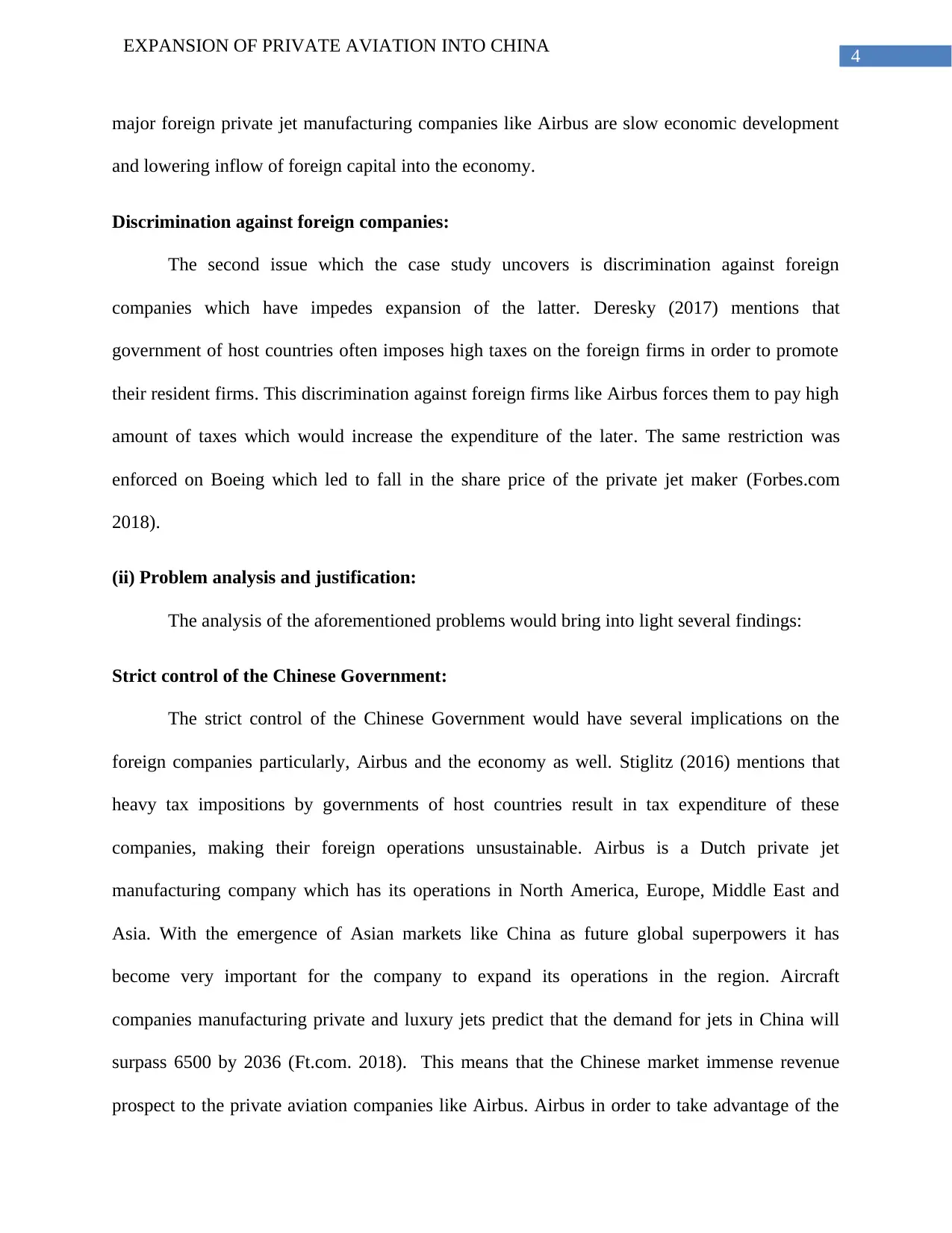
4
EXPANSION OF PRIVATE AVIATION INTO CHINA
major foreign private jet manufacturing companies like Airbus are slow economic development
and lowering inflow of foreign capital into the economy.
Discrimination against foreign companies:
The second issue which the case study uncovers is discrimination against foreign
companies which have impedes expansion of the latter. Deresky (2017) mentions that
government of host countries often imposes high taxes on the foreign firms in order to promote
their resident firms. This discrimination against foreign firms like Airbus forces them to pay high
amount of taxes which would increase the expenditure of the later. The same restriction was
enforced on Boeing which led to fall in the share price of the private jet maker (Forbes.com
2018).
(ii) Problem analysis and justification:
The analysis of the aforementioned problems would bring into light several findings:
Strict control of the Chinese Government:
The strict control of the Chinese Government would have several implications on the
foreign companies particularly, Airbus and the economy as well. Stiglitz (2016) mentions that
heavy tax impositions by governments of host countries result in tax expenditure of these
companies, making their foreign operations unsustainable. Airbus is a Dutch private jet
manufacturing company which has its operations in North America, Europe, Middle East and
Asia. With the emergence of Asian markets like China as future global superpowers it has
become very important for the company to expand its operations in the region. Aircraft
companies manufacturing private and luxury jets predict that the demand for jets in China will
surpass 6500 by 2036 (Ft.com. 2018). This means that the Chinese market immense revenue
prospect to the private aviation companies like Airbus. Airbus in order to take advantage of the
EXPANSION OF PRIVATE AVIATION INTO CHINA
major foreign private jet manufacturing companies like Airbus are slow economic development
and lowering inflow of foreign capital into the economy.
Discrimination against foreign companies:
The second issue which the case study uncovers is discrimination against foreign
companies which have impedes expansion of the latter. Deresky (2017) mentions that
government of host countries often imposes high taxes on the foreign firms in order to promote
their resident firms. This discrimination against foreign firms like Airbus forces them to pay high
amount of taxes which would increase the expenditure of the later. The same restriction was
enforced on Boeing which led to fall in the share price of the private jet maker (Forbes.com
2018).
(ii) Problem analysis and justification:
The analysis of the aforementioned problems would bring into light several findings:
Strict control of the Chinese Government:
The strict control of the Chinese Government would have several implications on the
foreign companies particularly, Airbus and the economy as well. Stiglitz (2016) mentions that
heavy tax impositions by governments of host countries result in tax expenditure of these
companies, making their foreign operations unsustainable. Airbus is a Dutch private jet
manufacturing company which has its operations in North America, Europe, Middle East and
Asia. With the emergence of Asian markets like China as future global superpowers it has
become very important for the company to expand its operations in the region. Aircraft
companies manufacturing private and luxury jets predict that the demand for jets in China will
surpass 6500 by 2036 (Ft.com. 2018). This means that the Chinese market immense revenue
prospect to the private aviation companies like Airbus. Airbus in order to take advantage of the
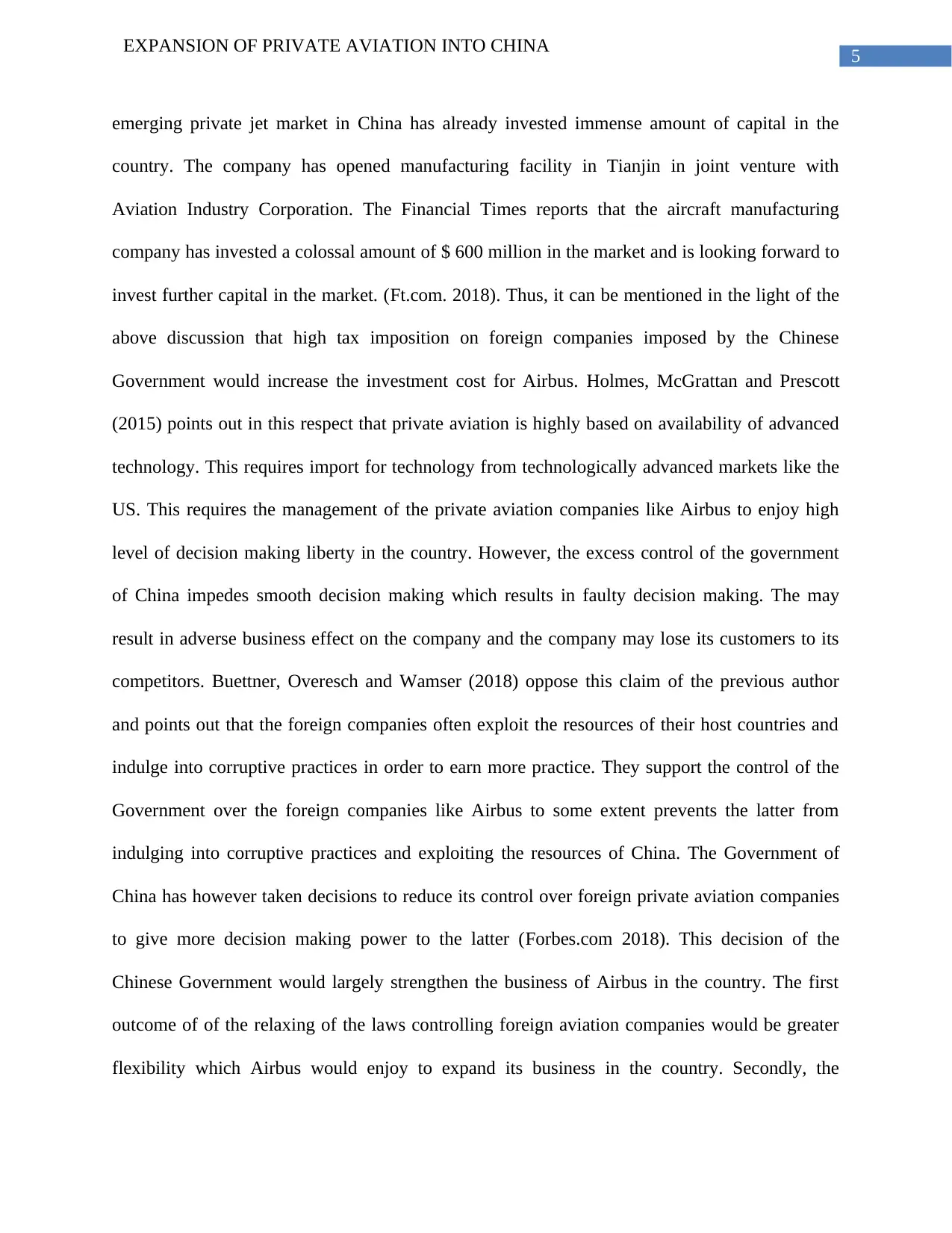
5
EXPANSION OF PRIVATE AVIATION INTO CHINA
emerging private jet market in China has already invested immense amount of capital in the
country. The company has opened manufacturing facility in Tianjin in joint venture with
Aviation Industry Corporation. The Financial Times reports that the aircraft manufacturing
company has invested a colossal amount of $ 600 million in the market and is looking forward to
invest further capital in the market. (Ft.com. 2018). Thus, it can be mentioned in the light of the
above discussion that high tax imposition on foreign companies imposed by the Chinese
Government would increase the investment cost for Airbus. Holmes, McGrattan and Prescott
(2015) points out in this respect that private aviation is highly based on availability of advanced
technology. This requires import for technology from technologically advanced markets like the
US. This requires the management of the private aviation companies like Airbus to enjoy high
level of decision making liberty in the country. However, the excess control of the government
of China impedes smooth decision making which results in faulty decision making. The may
result in adverse business effect on the company and the company may lose its customers to its
competitors. Buettner, Overesch and Wamser (2018) oppose this claim of the previous author
and points out that the foreign companies often exploit the resources of their host countries and
indulge into corruptive practices in order to earn more practice. They support the control of the
Government over the foreign companies like Airbus to some extent prevents the latter from
indulging into corruptive practices and exploiting the resources of China. The Government of
China has however taken decisions to reduce its control over foreign private aviation companies
to give more decision making power to the latter (Forbes.com 2018). This decision of the
Chinese Government would largely strengthen the business of Airbus in the country. The first
outcome of of the relaxing of the laws controlling foreign aviation companies would be greater
flexibility which Airbus would enjoy to expand its business in the country. Secondly, the
EXPANSION OF PRIVATE AVIATION INTO CHINA
emerging private jet market in China has already invested immense amount of capital in the
country. The company has opened manufacturing facility in Tianjin in joint venture with
Aviation Industry Corporation. The Financial Times reports that the aircraft manufacturing
company has invested a colossal amount of $ 600 million in the market and is looking forward to
invest further capital in the market. (Ft.com. 2018). Thus, it can be mentioned in the light of the
above discussion that high tax imposition on foreign companies imposed by the Chinese
Government would increase the investment cost for Airbus. Holmes, McGrattan and Prescott
(2015) points out in this respect that private aviation is highly based on availability of advanced
technology. This requires import for technology from technologically advanced markets like the
US. This requires the management of the private aviation companies like Airbus to enjoy high
level of decision making liberty in the country. However, the excess control of the government
of China impedes smooth decision making which results in faulty decision making. The may
result in adverse business effect on the company and the company may lose its customers to its
competitors. Buettner, Overesch and Wamser (2018) oppose this claim of the previous author
and points out that the foreign companies often exploit the resources of their host countries and
indulge into corruptive practices in order to earn more practice. They support the control of the
Government over the foreign companies like Airbus to some extent prevents the latter from
indulging into corruptive practices and exploiting the resources of China. The Government of
China has however taken decisions to reduce its control over foreign private aviation companies
to give more decision making power to the latter (Forbes.com 2018). This decision of the
Chinese Government would largely strengthen the business of Airbus in the country. The first
outcome of of the relaxing of the laws controlling foreign aviation companies would be greater
flexibility which Airbus would enjoy to expand its business in the country. Secondly, the
⊘ This is a preview!⊘
Do you want full access?
Subscribe today to unlock all pages.

Trusted by 1+ million students worldwide
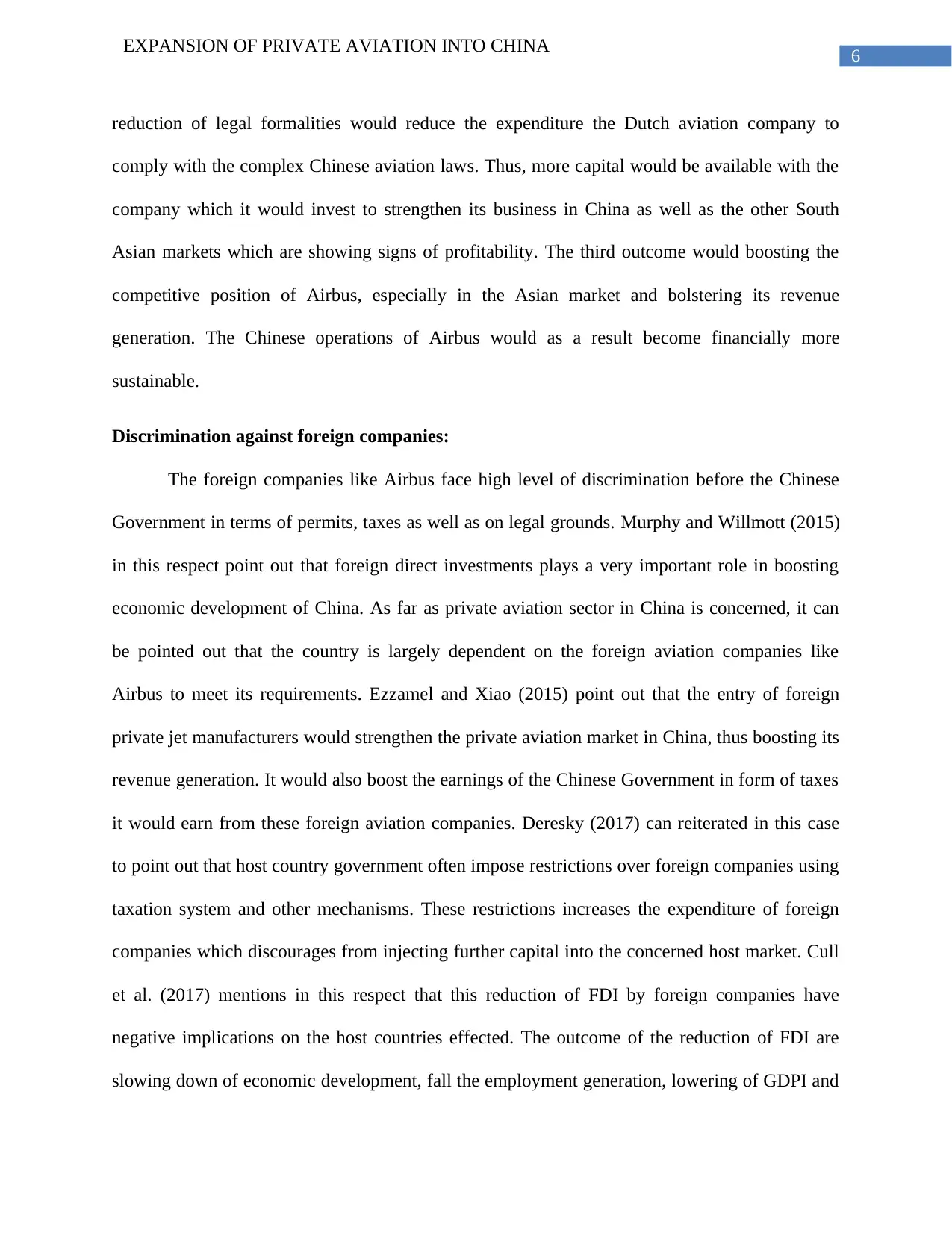
6
EXPANSION OF PRIVATE AVIATION INTO CHINA
reduction of legal formalities would reduce the expenditure the Dutch aviation company to
comply with the complex Chinese aviation laws. Thus, more capital would be available with the
company which it would invest to strengthen its business in China as well as the other South
Asian markets which are showing signs of profitability. The third outcome would boosting the
competitive position of Airbus, especially in the Asian market and bolstering its revenue
generation. The Chinese operations of Airbus would as a result become financially more
sustainable.
Discrimination against foreign companies:
The foreign companies like Airbus face high level of discrimination before the Chinese
Government in terms of permits, taxes as well as on legal grounds. Murphy and Willmott (2015)
in this respect point out that foreign direct investments plays a very important role in boosting
economic development of China. As far as private aviation sector in China is concerned, it can
be pointed out that the country is largely dependent on the foreign aviation companies like
Airbus to meet its requirements. Ezzamel and Xiao (2015) point out that the entry of foreign
private jet manufacturers would strengthen the private aviation market in China, thus boosting its
revenue generation. It would also boost the earnings of the Chinese Government in form of taxes
it would earn from these foreign aviation companies. Deresky (2017) can reiterated in this case
to point out that host country government often impose restrictions over foreign companies using
taxation system and other mechanisms. These restrictions increases the expenditure of foreign
companies which discourages from injecting further capital into the concerned host market. Cull
et al. (2017) mentions in this respect that this reduction of FDI by foreign companies have
negative implications on the host countries effected. The outcome of the reduction of FDI are
slowing down of economic development, fall the employment generation, lowering of GDPI and
EXPANSION OF PRIVATE AVIATION INTO CHINA
reduction of legal formalities would reduce the expenditure the Dutch aviation company to
comply with the complex Chinese aviation laws. Thus, more capital would be available with the
company which it would invest to strengthen its business in China as well as the other South
Asian markets which are showing signs of profitability. The third outcome would boosting the
competitive position of Airbus, especially in the Asian market and bolstering its revenue
generation. The Chinese operations of Airbus would as a result become financially more
sustainable.
Discrimination against foreign companies:
The foreign companies like Airbus face high level of discrimination before the Chinese
Government in terms of permits, taxes as well as on legal grounds. Murphy and Willmott (2015)
in this respect point out that foreign direct investments plays a very important role in boosting
economic development of China. As far as private aviation sector in China is concerned, it can
be pointed out that the country is largely dependent on the foreign aviation companies like
Airbus to meet its requirements. Ezzamel and Xiao (2015) point out that the entry of foreign
private jet manufacturers would strengthen the private aviation market in China, thus boosting its
revenue generation. It would also boost the earnings of the Chinese Government in form of taxes
it would earn from these foreign aviation companies. Deresky (2017) can reiterated in this case
to point out that host country government often impose restrictions over foreign companies using
taxation system and other mechanisms. These restrictions increases the expenditure of foreign
companies which discourages from injecting further capital into the concerned host market. Cull
et al. (2017) mentions in this respect that this reduction of FDI by foreign companies have
negative implications on the host countries effected. The outcome of the reduction of FDI are
slowing down of economic development, fall the employment generation, lowering of GDPI and
Paraphrase This Document
Need a fresh take? Get an instant paraphrase of this document with our AI Paraphraser
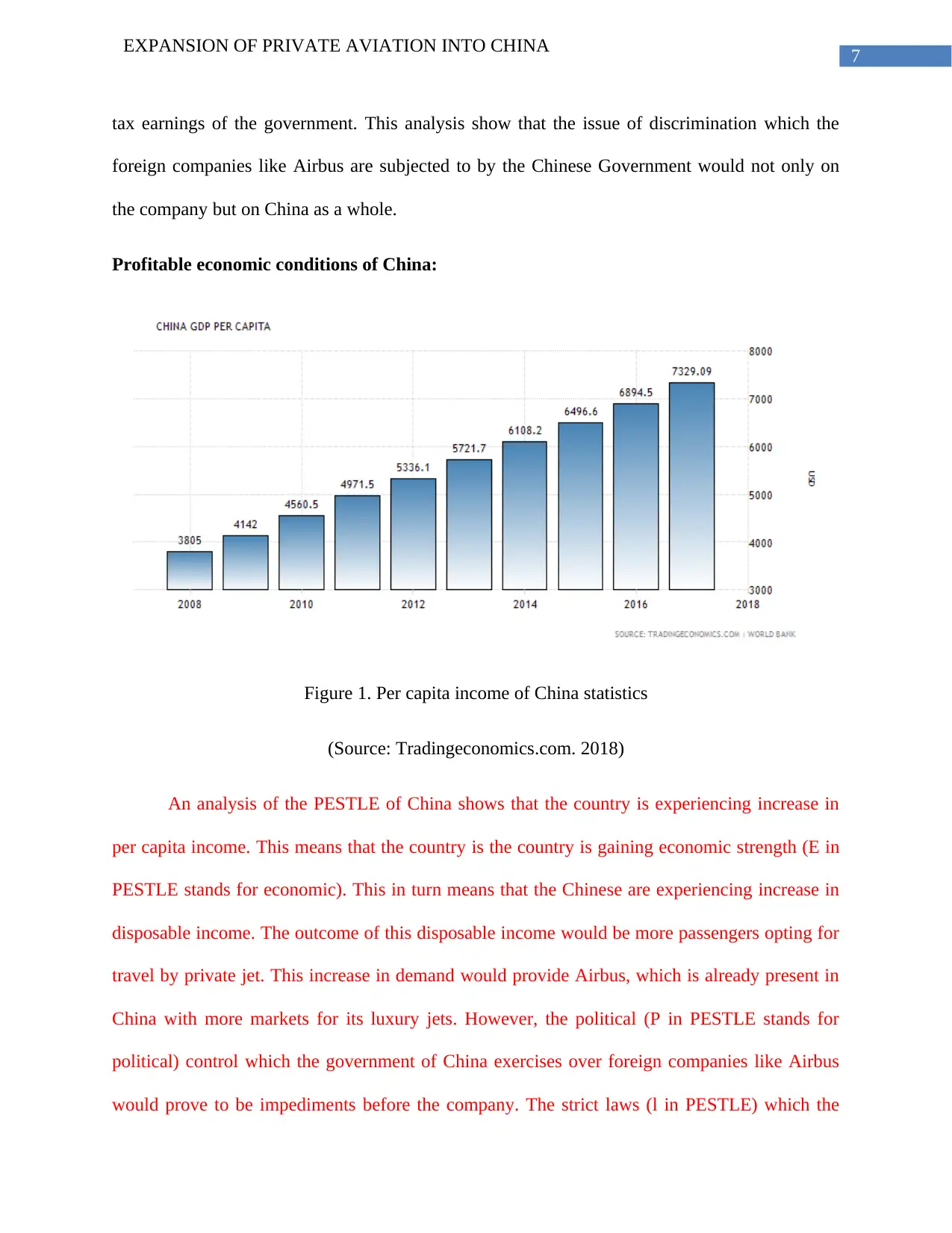
7
EXPANSION OF PRIVATE AVIATION INTO CHINA
tax earnings of the government. This analysis show that the issue of discrimination which the
foreign companies like Airbus are subjected to by the Chinese Government would not only on
the company but on China as a whole.
Profitable economic conditions of China:
Figure 1. Per capita income of China statistics
(Source: Tradingeconomics.com. 2018)
An analysis of the PESTLE of China shows that the country is experiencing increase in
per capita income. This means that the country is the country is gaining economic strength (E in
PESTLE stands for economic). This in turn means that the Chinese are experiencing increase in
disposable income. The outcome of this disposable income would be more passengers opting for
travel by private jet. This increase in demand would provide Airbus, which is already present in
China with more markets for its luxury jets. However, the political (P in PESTLE stands for
political) control which the government of China exercises over foreign companies like Airbus
would prove to be impediments before the company. The strict laws (l in PESTLE) which the
EXPANSION OF PRIVATE AVIATION INTO CHINA
tax earnings of the government. This analysis show that the issue of discrimination which the
foreign companies like Airbus are subjected to by the Chinese Government would not only on
the company but on China as a whole.
Profitable economic conditions of China:
Figure 1. Per capita income of China statistics
(Source: Tradingeconomics.com. 2018)
An analysis of the PESTLE of China shows that the country is experiencing increase in
per capita income. This means that the country is the country is gaining economic strength (E in
PESTLE stands for economic). This in turn means that the Chinese are experiencing increase in
disposable income. The outcome of this disposable income would be more passengers opting for
travel by private jet. This increase in demand would provide Airbus, which is already present in
China with more markets for its luxury jets. However, the political (P in PESTLE stands for
political) control which the government of China exercises over foreign companies like Airbus
would prove to be impediments before the company. The strict laws (l in PESTLE) which the
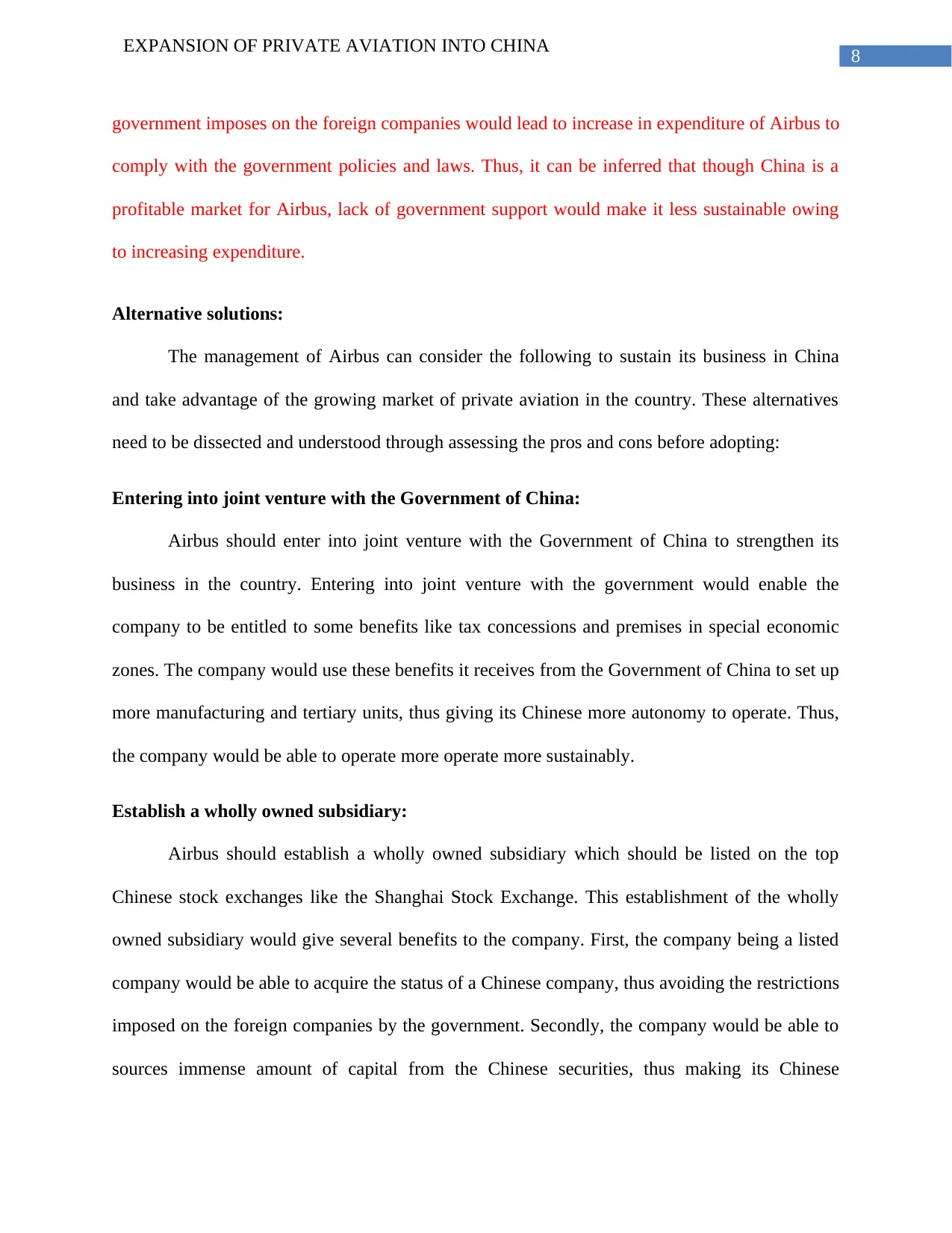
8
EXPANSION OF PRIVATE AVIATION INTO CHINA
government imposes on the foreign companies would lead to increase in expenditure of Airbus to
comply with the government policies and laws. Thus, it can be inferred that though China is a
profitable market for Airbus, lack of government support would make it less sustainable owing
to increasing expenditure.
Alternative solutions:
The management of Airbus can consider the following to sustain its business in China
and take advantage of the growing market of private aviation in the country. These alternatives
need to be dissected and understood through assessing the pros and cons before adopting:
Entering into joint venture with the Government of China:
Airbus should enter into joint venture with the Government of China to strengthen its
business in the country. Entering into joint venture with the government would enable the
company to be entitled to some benefits like tax concessions and premises in special economic
zones. The company would use these benefits it receives from the Government of China to set up
more manufacturing and tertiary units, thus giving its Chinese more autonomy to operate. Thus,
the company would be able to operate more operate more sustainably.
Establish a wholly owned subsidiary:
Airbus should establish a wholly owned subsidiary which should be listed on the top
Chinese stock exchanges like the Shanghai Stock Exchange. This establishment of the wholly
owned subsidiary would give several benefits to the company. First, the company being a listed
company would be able to acquire the status of a Chinese company, thus avoiding the restrictions
imposed on the foreign companies by the government. Secondly, the company would be able to
sources immense amount of capital from the Chinese securities, thus making its Chinese
EXPANSION OF PRIVATE AVIATION INTO CHINA
government imposes on the foreign companies would lead to increase in expenditure of Airbus to
comply with the government policies and laws. Thus, it can be inferred that though China is a
profitable market for Airbus, lack of government support would make it less sustainable owing
to increasing expenditure.
Alternative solutions:
The management of Airbus can consider the following to sustain its business in China
and take advantage of the growing market of private aviation in the country. These alternatives
need to be dissected and understood through assessing the pros and cons before adopting:
Entering into joint venture with the Government of China:
Airbus should enter into joint venture with the Government of China to strengthen its
business in the country. Entering into joint venture with the government would enable the
company to be entitled to some benefits like tax concessions and premises in special economic
zones. The company would use these benefits it receives from the Government of China to set up
more manufacturing and tertiary units, thus giving its Chinese more autonomy to operate. Thus,
the company would be able to operate more operate more sustainably.
Establish a wholly owned subsidiary:
Airbus should establish a wholly owned subsidiary which should be listed on the top
Chinese stock exchanges like the Shanghai Stock Exchange. This establishment of the wholly
owned subsidiary would give several benefits to the company. First, the company being a listed
company would be able to acquire the status of a Chinese company, thus avoiding the restrictions
imposed on the foreign companies by the government. Secondly, the company would be able to
sources immense amount of capital from the Chinese securities, thus making its Chinese
⊘ This is a preview!⊘
Do you want full access?
Subscribe today to unlock all pages.

Trusted by 1+ million students worldwide
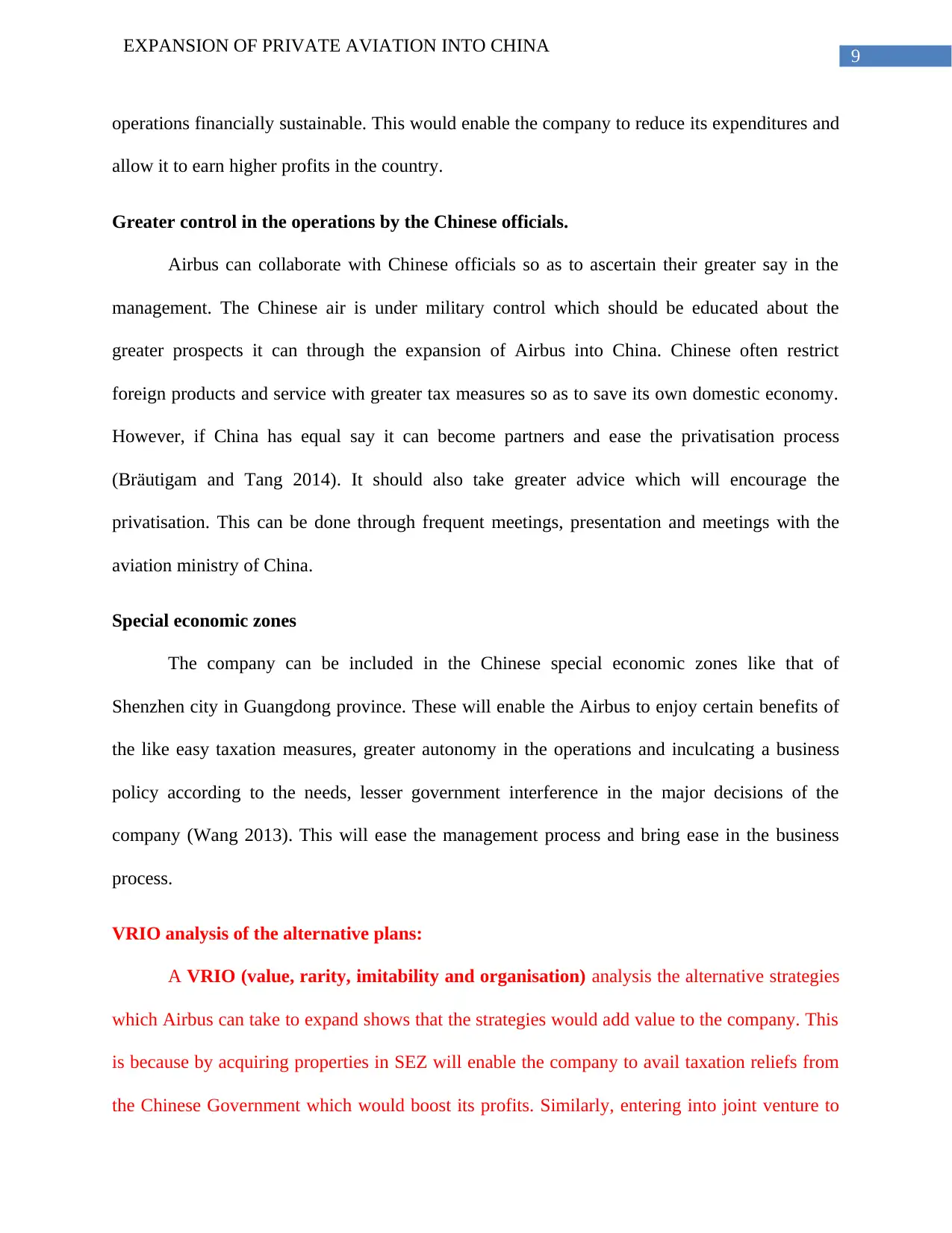
9
EXPANSION OF PRIVATE AVIATION INTO CHINA
operations financially sustainable. This would enable the company to reduce its expenditures and
allow it to earn higher profits in the country.
Greater control in the operations by the Chinese officials.
Airbus can collaborate with Chinese officials so as to ascertain their greater say in the
management. The Chinese air is under military control which should be educated about the
greater prospects it can through the expansion of Airbus into China. Chinese often restrict
foreign products and service with greater tax measures so as to save its own domestic economy.
However, if China has equal say it can become partners and ease the privatisation process
(Bräutigam and Tang 2014). It should also take greater advice which will encourage the
privatisation. This can be done through frequent meetings, presentation and meetings with the
aviation ministry of China.
Special economic zones
The company can be included in the Chinese special economic zones like that of
Shenzhen city in Guangdong province. These will enable the Airbus to enjoy certain benefits of
the like easy taxation measures, greater autonomy in the operations and inculcating a business
policy according to the needs, lesser government interference in the major decisions of the
company (Wang 2013). This will ease the management process and bring ease in the business
process.
VRIO analysis of the alternative plans:
A VRIO (value, rarity, imitability and organisation) analysis the alternative strategies
which Airbus can take to expand shows that the strategies would add value to the company. This
is because by acquiring properties in SEZ will enable the company to avail taxation reliefs from
the Chinese Government which would boost its profits. Similarly, entering into joint venture to
EXPANSION OF PRIVATE AVIATION INTO CHINA
operations financially sustainable. This would enable the company to reduce its expenditures and
allow it to earn higher profits in the country.
Greater control in the operations by the Chinese officials.
Airbus can collaborate with Chinese officials so as to ascertain their greater say in the
management. The Chinese air is under military control which should be educated about the
greater prospects it can through the expansion of Airbus into China. Chinese often restrict
foreign products and service with greater tax measures so as to save its own domestic economy.
However, if China has equal say it can become partners and ease the privatisation process
(Bräutigam and Tang 2014). It should also take greater advice which will encourage the
privatisation. This can be done through frequent meetings, presentation and meetings with the
aviation ministry of China.
Special economic zones
The company can be included in the Chinese special economic zones like that of
Shenzhen city in Guangdong province. These will enable the Airbus to enjoy certain benefits of
the like easy taxation measures, greater autonomy in the operations and inculcating a business
policy according to the needs, lesser government interference in the major decisions of the
company (Wang 2013). This will ease the management process and bring ease in the business
process.
VRIO analysis of the alternative plans:
A VRIO (value, rarity, imitability and organisation) analysis the alternative strategies
which Airbus can take to expand shows that the strategies would add value to the company. This
is because by acquiring properties in SEZ will enable the company to avail taxation reliefs from
the Chinese Government which would boost its profits. Similarly, entering into joint venture to
Paraphrase This Document
Need a fresh take? Get an instant paraphrase of this document with our AI Paraphraser
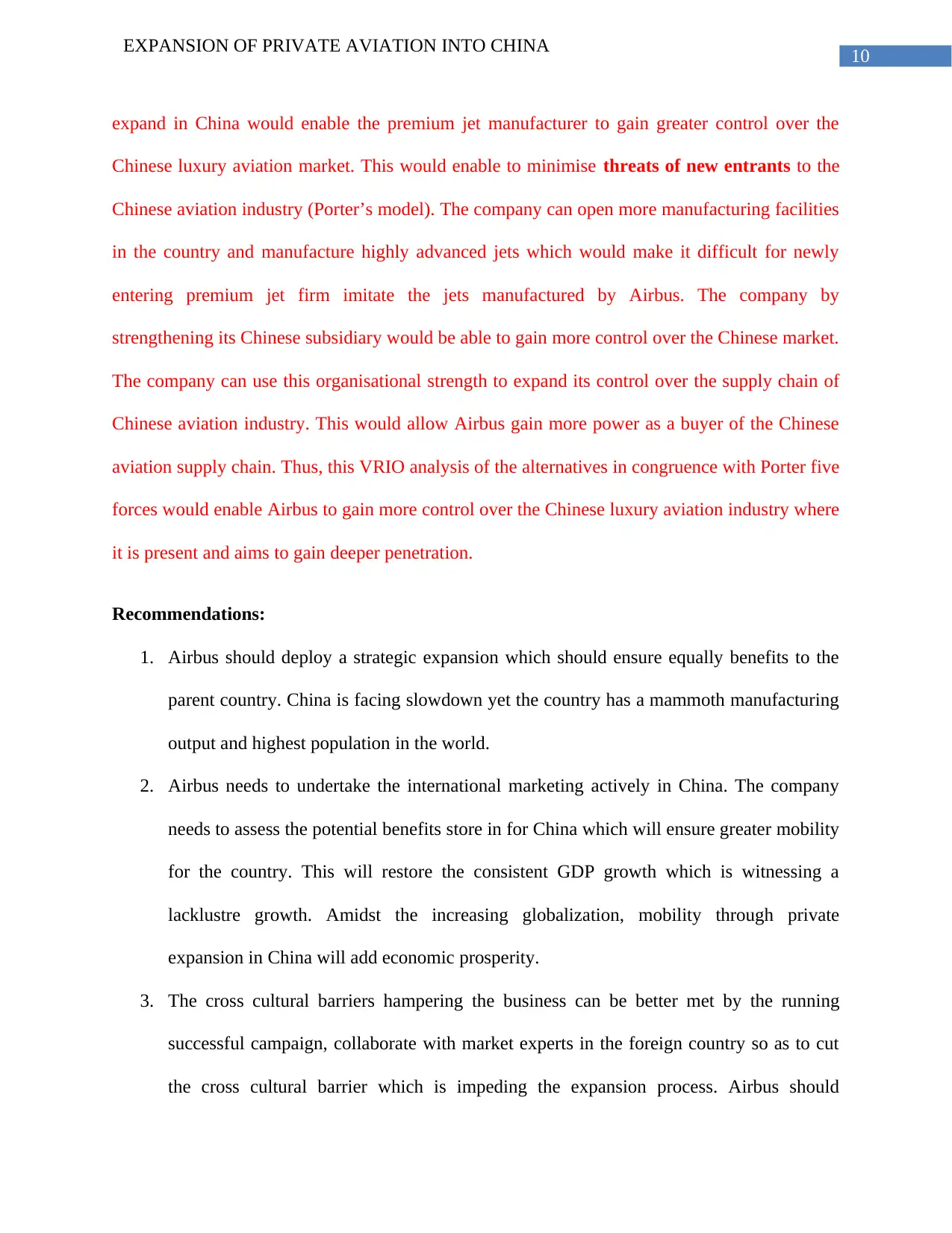
10
EXPANSION OF PRIVATE AVIATION INTO CHINA
expand in China would enable the premium jet manufacturer to gain greater control over the
Chinese luxury aviation market. This would enable to minimise threats of new entrants to the
Chinese aviation industry (Porter’s model). The company can open more manufacturing facilities
in the country and manufacture highly advanced jets which would make it difficult for newly
entering premium jet firm imitate the jets manufactured by Airbus. The company by
strengthening its Chinese subsidiary would be able to gain more control over the Chinese market.
The company can use this organisational strength to expand its control over the supply chain of
Chinese aviation industry. This would allow Airbus gain more power as a buyer of the Chinese
aviation supply chain. Thus, this VRIO analysis of the alternatives in congruence with Porter five
forces would enable Airbus to gain more control over the Chinese luxury aviation industry where
it is present and aims to gain deeper penetration.
Recommendations:
1. Airbus should deploy a strategic expansion which should ensure equally benefits to the
parent country. China is facing slowdown yet the country has a mammoth manufacturing
output and highest population in the world.
2. Airbus needs to undertake the international marketing actively in China. The company
needs to assess the potential benefits store in for China which will ensure greater mobility
for the country. This will restore the consistent GDP growth which is witnessing a
lacklustre growth. Amidst the increasing globalization, mobility through private
expansion in China will add economic prosperity.
3. The cross cultural barriers hampering the business can be better met by the running
successful campaign, collaborate with market experts in the foreign country so as to cut
the cross cultural barrier which is impeding the expansion process. Airbus should
EXPANSION OF PRIVATE AVIATION INTO CHINA
expand in China would enable the premium jet manufacturer to gain greater control over the
Chinese luxury aviation market. This would enable to minimise threats of new entrants to the
Chinese aviation industry (Porter’s model). The company can open more manufacturing facilities
in the country and manufacture highly advanced jets which would make it difficult for newly
entering premium jet firm imitate the jets manufactured by Airbus. The company by
strengthening its Chinese subsidiary would be able to gain more control over the Chinese market.
The company can use this organisational strength to expand its control over the supply chain of
Chinese aviation industry. This would allow Airbus gain more power as a buyer of the Chinese
aviation supply chain. Thus, this VRIO analysis of the alternatives in congruence with Porter five
forces would enable Airbus to gain more control over the Chinese luxury aviation industry where
it is present and aims to gain deeper penetration.
Recommendations:
1. Airbus should deploy a strategic expansion which should ensure equally benefits to the
parent country. China is facing slowdown yet the country has a mammoth manufacturing
output and highest population in the world.
2. Airbus needs to undertake the international marketing actively in China. The company
needs to assess the potential benefits store in for China which will ensure greater mobility
for the country. This will restore the consistent GDP growth which is witnessing a
lacklustre growth. Amidst the increasing globalization, mobility through private
expansion in China will add economic prosperity.
3. The cross cultural barriers hampering the business can be better met by the running
successful campaign, collaborate with market experts in the foreign country so as to cut
the cross cultural barrier which is impeding the expansion process. Airbus should
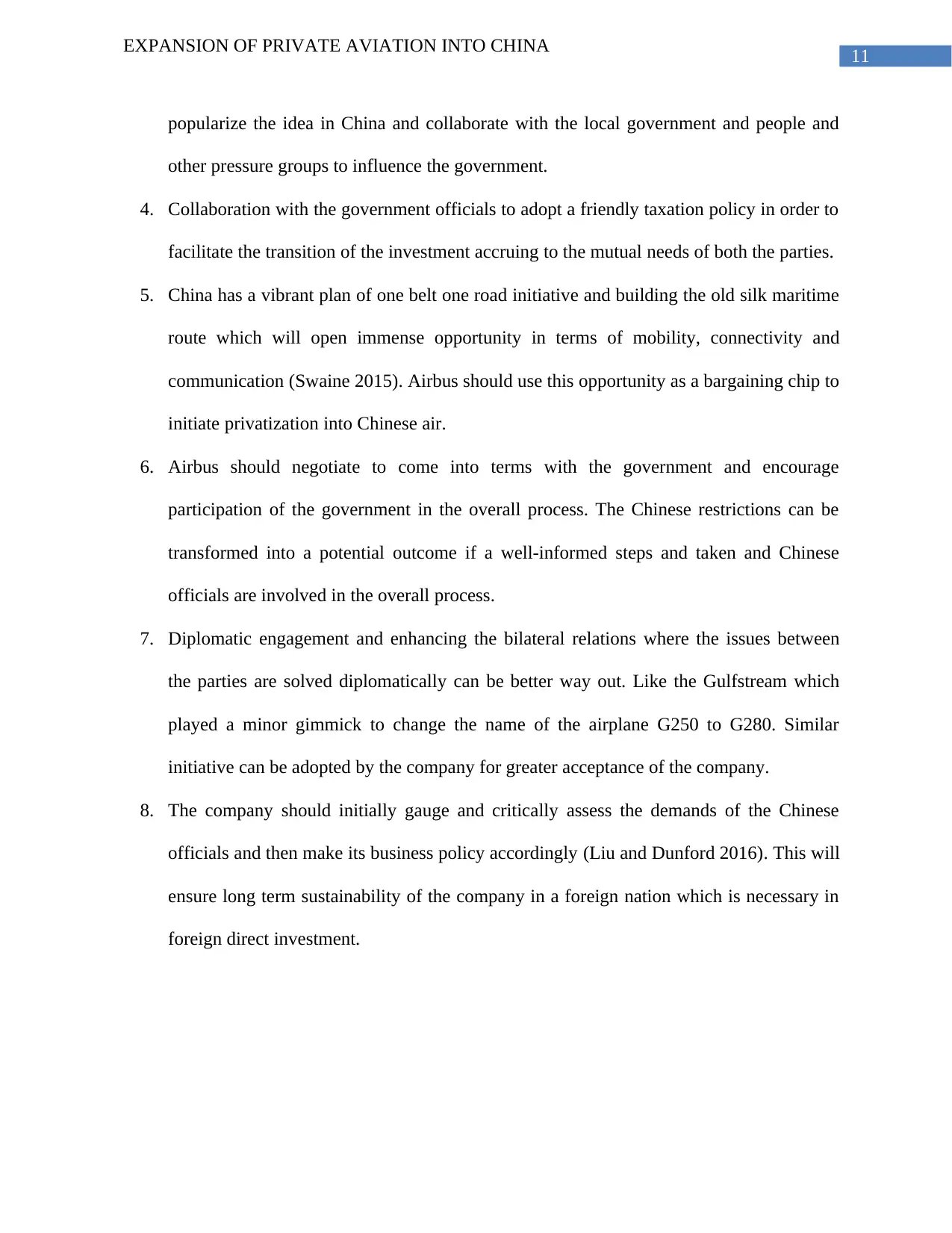
11
EXPANSION OF PRIVATE AVIATION INTO CHINA
popularize the idea in China and collaborate with the local government and people and
other pressure groups to influence the government.
4. Collaboration with the government officials to adopt a friendly taxation policy in order to
facilitate the transition of the investment accruing to the mutual needs of both the parties.
5. China has a vibrant plan of one belt one road initiative and building the old silk maritime
route which will open immense opportunity in terms of mobility, connectivity and
communication (Swaine 2015). Airbus should use this opportunity as a bargaining chip to
initiate privatization into Chinese air.
6. Airbus should negotiate to come into terms with the government and encourage
participation of the government in the overall process. The Chinese restrictions can be
transformed into a potential outcome if a well-informed steps and taken and Chinese
officials are involved in the overall process.
7. Diplomatic engagement and enhancing the bilateral relations where the issues between
the parties are solved diplomatically can be better way out. Like the Gulfstream which
played a minor gimmick to change the name of the airplane G250 to G280. Similar
initiative can be adopted by the company for greater acceptance of the company.
8. The company should initially gauge and critically assess the demands of the Chinese
officials and then make its business policy accordingly (Liu and Dunford 2016). This will
ensure long term sustainability of the company in a foreign nation which is necessary in
foreign direct investment.
EXPANSION OF PRIVATE AVIATION INTO CHINA
popularize the idea in China and collaborate with the local government and people and
other pressure groups to influence the government.
4. Collaboration with the government officials to adopt a friendly taxation policy in order to
facilitate the transition of the investment accruing to the mutual needs of both the parties.
5. China has a vibrant plan of one belt one road initiative and building the old silk maritime
route which will open immense opportunity in terms of mobility, connectivity and
communication (Swaine 2015). Airbus should use this opportunity as a bargaining chip to
initiate privatization into Chinese air.
6. Airbus should negotiate to come into terms with the government and encourage
participation of the government in the overall process. The Chinese restrictions can be
transformed into a potential outcome if a well-informed steps and taken and Chinese
officials are involved in the overall process.
7. Diplomatic engagement and enhancing the bilateral relations where the issues between
the parties are solved diplomatically can be better way out. Like the Gulfstream which
played a minor gimmick to change the name of the airplane G250 to G280. Similar
initiative can be adopted by the company for greater acceptance of the company.
8. The company should initially gauge and critically assess the demands of the Chinese
officials and then make its business policy accordingly (Liu and Dunford 2016). This will
ensure long term sustainability of the company in a foreign nation which is necessary in
foreign direct investment.
⊘ This is a preview!⊘
Do you want full access?
Subscribe today to unlock all pages.

Trusted by 1+ million students worldwide
1 out of 16
Related Documents
Your All-in-One AI-Powered Toolkit for Academic Success.
+13062052269
info@desklib.com
Available 24*7 on WhatsApp / Email
![[object Object]](/_next/static/media/star-bottom.7253800d.svg)
Unlock your academic potential
Copyright © 2020–2026 A2Z Services. All Rights Reserved. Developed and managed by ZUCOL.





